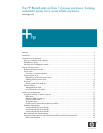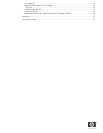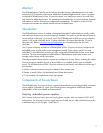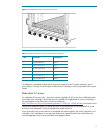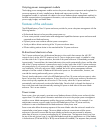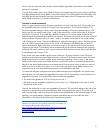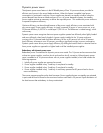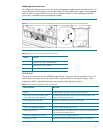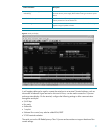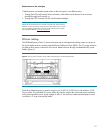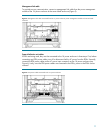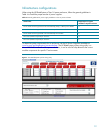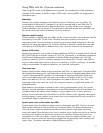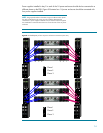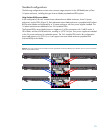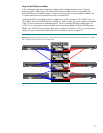7
Dynamic power saver
The dynamic power saver feature in the HP BladeSystem p-Class 1U power enclosure provides for
efficient use of power in the server blade enclosure. When this feature is enabled, total power
consumption is monitored in real time. Power supplies are placed in a standby condition when the
power demand from the server blade enclosure is low. As power demand increases, the standby
power supplies activate as necessary to deliver the required power. This enables the power enclosure
to operate at optimum efficiency.
Optimum efficiency can be achieved because of the power supply efficiency curve associated with
any power supply. Power supply efficiency is simply a measure of power in versus power out, so at
50 percent efficiency 2,000 W in would equal 1,000 W out. The difference is wasted energy, which
costs money.
Dynamic power saver recognizes that most power supplies operate less efficiently when lightly loaded
and more efficiently when heavily loaded. A power supply installed in the 1U power enclosure
running with a 10 percent load could have efficiency as low as 50 percent, but with a 50 percent
load, efficiency increases to over 90 percent, providing a significant savings in power consumption.
Dynamic power saver drives power supply efficiency by shifting the load so there is a heavier load on
fewer power supplies as opposed to a lighter load on all the installed power supplies.
Redundancy with dynamic power saver
Redundant power is maintained in dynamic power saver mode. The 1U power enclosure ensures that
at least two power supplies, one from bus A and one from bus B, are active. When dynamic power
saver is enabled on a 1U power enclosure with six power supplies installed, a low load initiates the
following sequence:
1. Initially all power supplies are powered as normal.
2. Power supplies installed in bay 3 and bay 6 are placed in standby.
3. Power supplies installed in bay 2 and bay 5 are placed in standby.
4. Power supplies installed in bay 1 and bay 4 are always powered at 50 percent load or less to
ensure redundancy.
The reverse sequence applies as the load increases. Power supplies that are on standby are activated
in pairs and the load is shared so the maximum load on each feed is 50 percent. Equal distribution of
the load ensures that redundancy is always maintained.



